-
Classifying Types of Paper for Recycling
When you implement a recycling program for your home or commercial office, chances are that you will be recycling a significant amount of paper products. Designated recycling bins will help you separate paper goods from other recyclables, such as plastics or metals. If you are planning to recycle near Atlanta , it is a terrific idea to gather information about various types of paper products and how they can be recycled. To help you gear up for your new waste management plan, read on for an overview of the different classifications for paper and cardboard recycling.
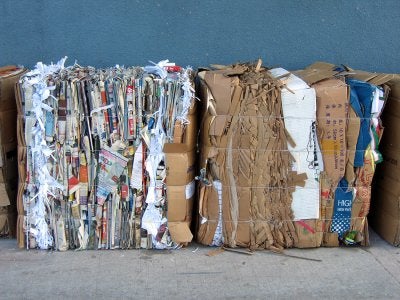
OCC
The term OCC stands for Old Corrugated Containers, and corrugated cardboard is among the most commonly recycled paper products. You can identify whether you are recycling OCC by looking at its material composition. Typically, OCC is distinguished by its ridged surface, which is housed between two flat pieces of cardboard. OCC can be recycled and transformed into a variety of other materials, including postal boxes, paper bags, and more.
ONP
When you have old issues of the newspaper on hand, you will need to figure out how to recycle your ONP, or Old Newspaper. A newspaper is only classified as ONP after it has been distributed to a home or business client for review. When ONP is recycled, it can be transformed into many different types of useful products, including paperboard, tissue, and art paper. In order to process ONP, your recycling center may need to send this material to a special paper mill.
High-Grade Deinked Paper
Business offices and other commercial settings often create large quantities of high-grade paper waste. Some examples of high-grade paper include letterhead, stationary, and business documents. Before high-grade paper can be transformed into new products, it must be sent through a deinking procedure. Removing the ink allows the recycler to process the paper, without having to deal with color inconsistences or variations.
-
The Lifecycle of Recycled Paper
Paper products surround us throughout our days, and we may not think about what happens to paper after it is tossed in the recycling bin. In this video, you will take a look at some amazing recycling facts about paper. In the past 26 years, the United States alone has recycled 1 billion tons of paper. When you purchase recycling bins in Atlanta, you can rest assured that your waste management company will send your paper goods to the correct recycling facility.
A recycling company will bring your paper waste to a mill for processing. At the mill, the paper will be shredded into a product that is known as pulp. Next, this pulp will be sent to the recycling center so that it can be transformed into new paper items. When you purchase a paper item, chances are that it has been manufactured from recycled consumer waste.
-
What Happens to Recycled Plastic?
Does your home or business use recycling bins in Atlanta as part of a responsible waste management program ? If so, then you may be wondering what happens to the empty water bottles and milk gallons that you toss in the bin. Continue reading to learn what happens to recycled plastic.
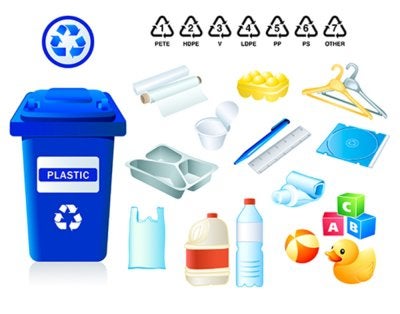
The plastic is collected.
To begin the recycling process, used plastic items are first collected through industrial, commercial, and residential recycling programs. The materials that are collected are then transported to a facility that specializes in sorting the plastic, paper, metal, and other items. Also, the plastic items might be sorted into those that come from plastic bottles, plastic bags, and other plastic varieties. Then, the sorted materials are baled and prepared for transport.
The plastic is processed.
The bales of plastic materials are sent to a manufacturing facility and then processed. During this stage, the plastic is chopped up into small pieces to make them easier to process. Next, to ensure a quality product at the end of the plastic recycling process, the little pieces of plastic are cleansed of any labels, dirt, or other debris before being dried. Finally, the clean plastic pieces are melted and then compressed into little pellets. At this stage, the processed plastic that has been transformed into little pellets is sold to various industries to be transformed into something new.
The plastic is reused.
Once the recycled plastic is in the hands of manufacturers, it can be used for a wide range of purposes. Your recycled milk jugs, laundry detergent containers, and shampoo bottles, for example, are usually made of a sturdy but lightweight plastic that, after being recycled, can be used to make items like new milk jugs, lawn décor, plastic lumber, and recycling bins. Your plastic grocery bags, food wrappers, and bubble wrap can be utilized to make everything from playground equipment and park benches to fencing and new plastic bags. Finally, your soft drink and water bottles can be recycled and made into items such as clothing, carpeting, sleeping bags, and new bottles.
-
The Benefits of Recycling Glass
When you visit a location that has recycling bins , you’ll often see one that is designated for glass, because recycling this material offers several advantages. If you’re wondering if you could benefit from glass recycling serving Atlanta, then continue reading.
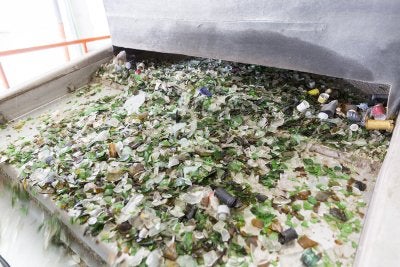
Recycling glass can be done repeatedly.
To understand the benefits of glass recycling, it can be helpful to know how it is created. Glass is made from materials that are readily available in our environment including soda ash, limestone, and sand. Silica, in the form of sand, is the primary ingredient and, when combined with soda ash and limestone and heated to incredibly high temperatures, these minerals melt and form glass. In addition to these ingredients, other materials can be included to give the glass different properties or colors. Because of the way in which glass is made, it can be processed again and again with no loss in purity or quality, meaning that it is a valuable and practical recycling material.
Recycling glass benefits the environment.
When new glass is produced, a significant amount of what goes into it is often glass that has already been made and recycled. This recycled glass that is considered to be “furnace ready” is referred to a “cullet” in the industry. Cullet can be substituted for as much as 95% of raw materials, making it a smart item to recycle. Also, glass provides a better material for food packaging because it is 100% recyclable, a claim that few other food packaging materials can claim. Recycling glass can help the environment by providing industries with more glass to use for packaging and at potentially lower costs.
Recycling glass can reduce energy usage.
The more cullet that is used in the recipe for new glass, the less heat and energy is needed for the glass-making process. By recycling glass, you can help return more of this material to the recycling system where it can be processed and converted into cullet. For this reason, recycling glass can reduce your carbon footprint.
-
The Glass Recycling Process
Glass is one of the most reliably recyclable materials out there. Have you ever wondered how exactly glass is recycled? What happens to your bottles and jars after your Atlanta recycling service picks it up? This video has the answer.
After the glass gets picked up from your curb, it’s sent to a local recycling depot, where it gets sorted. Next, the glass goes to a reprocessing company and is crushed into little pieces, or “cullet.” The cullet is combined with silicate (sand), sodium carbonate, and calcium carbonate, then heated to over 1000 degrees to make new glass. Clear glass tends to be remade into food jars, while darker glass is most often recycled into beer and wine bottles. Though this video focuses on recycling in Devon, UK, the same process applies to almost everywhere glass is recycled.
-
Improving Your Recycling Habits
With global climate change becoming an ever-clearer reality, it’s important for everyone to do their part. One of the easiest ways to reduce your carbon footprint is to learn more about recycling. If you have any questions about recycling, be sure to watch this video and reach out to a waste management company in Atlanta .
This video includes a number of humorous reducing, reusing, and recycling suggestions provided by several YouTube personalities. Instead of throwing your paper into the trash, you can cut it up into small pieces and use it as compost. You might also deposit your empty cans and bottles for money, then use that money to treat yourself to something nice at the end of the month. Each time you go to the grocery store, be sure to take a reusable bag. It’s also a good idea to take a travel mug with you when you go to your favorite coffee shop.
-
Spotlight on Sustainability
Sustainability is a key concern for many of today’s business. When you are researching sustainable practices for your company, you may want to take the time to gather information about waste management and recycling. By updating your trash removal practices with help from a company offering recycling bins in Atlanta , you will feel great knowing that your business is operating in a sustainable and environmentally friendly fashion.
There are several ways that recycling can boost your sustainability. A recycled item will be reused for a new purpose, thereby helping to reduce the carbon emissions and consumption of natural resources that are associated with creating products from all new materials. Recycling can also cut back on the amount of debris and waste that you are tossing in your dumpster. Implementing a recycling program can also place sustainability at the forefront of your business identity. A recycling center can provide you with additional information about the sustainable benefits of recycling.
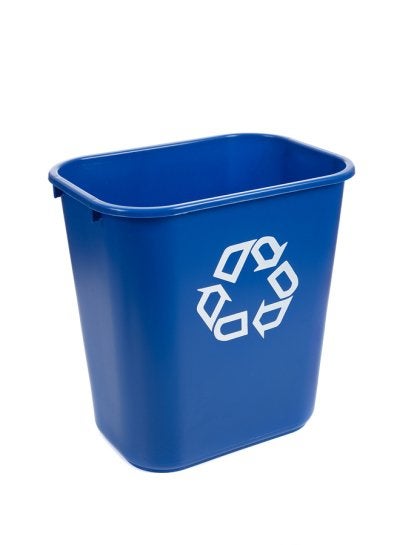
-
How Does Recycling Help?
Recycling is a hot topic in the waste management industry. With many myths and facts circulating about recycling’s effectiveness, it is a good idea to do your research about the benefits of recycling. In this video, you will learn all about how recycling works and how recycling can help to protect the environment. A waste disposal company can answer your questions about how to properly recycle near Atlanta.
When you create a recycling program for your business , you will be taking a big step towards improving your sustainability. Choosing to recycle your waste and excess goods will place valuable materials back into the manufacturing industry, while also reducing the burden on natural resources. If you are wondering about how recycling can benefit you, be sure to set up a consultation with waste management experts in your city.
-
How to Identify the Recyclable Items in Your Workplace
Workplace recycling programs are a simple and effective way to reduce a company’s waste generation and carbon footprint. It’s common for people to want to do their part and recycle near Atlanta but, in many cases, they aren’t certain about what materials are supposed to go in the recycling bins .
The first step in identifying what items in your workplace are recyclable is to take a closer look at the recycling bins. Many establishments post a guide either on or near the bin to help employees recycle effectively. Also, pay attention to the color of the bin. Your workplace may have separate bins for compost, metal, cardboard, paper, or plastic recycling.
If your recycling bins offer no guidance about what should go inside of them, speak with an employee who works with the recycling program or contact the company that handles the recycling for your workplace. Some of the most common recyclable materials you might find yourself disposing of are paper, cardboard boxes, plastic bottles, aluminum cans, and plastic containers.
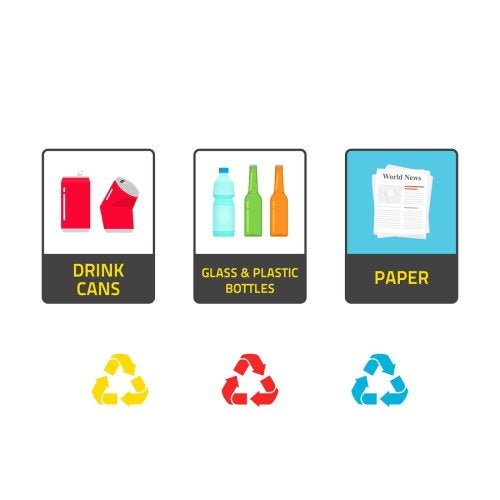
-
Training Employees on Your Company’s Recycling Policy
A company-wide recycling policy is a smart decision for lots of reasons. For example, depending on the industry you work in and the nature of the products or services you provide, recycling can help reduce your raw material expenses. A recycling policy is also good for employee morale and can even help with your organization’s outward facing brand identity. When you partner with a waste management and recycling company in Atlanta , coming up with a company-wide recycling policy is easy—it’s implementing the policy that can be a struggle. To help get everyone the same page as quickly as possible, here are some tips for training employees on your company’s new recycling policy.
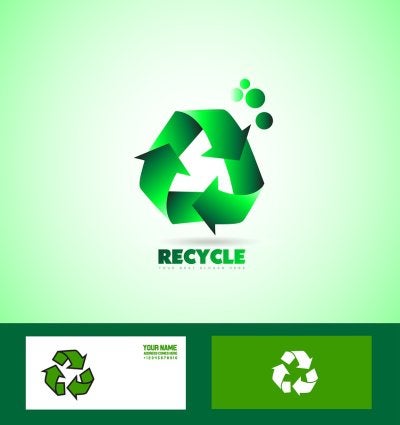
Assign a Recycling Coordinator
To help implement your new recycling policy, assign a dedicated recycling coordinator or appoint recycling “supervisors” in each department. Whoever is in charge, this person (or these people) will be the go-to when anyone has questions or concerns about recycling at work. Recycling supervisors should also be in charge of educating the rest of your workforce regarding best recycling practices.
Hold a Kick-Off Event
Another way to help get your workforce onboard and excited about recycling is to throw a kick-off event where you introduce the new recycling policy, talk about the benefits of recycling, and explain how it will benefit the company and as a result benefit the employees. Make this event fun so your employees leave feeling excited and energetic about recycling instead of just another boring workplace policy they need to follow.
Recognize Employees for Their Efforts
As your employees get used to the new recycling policy, recognize those employees who have bought in and are making efforts to ensure the recycling policy is successful. This will reinforce good recycling habits and encourage other employees to think about ways they can do better at recycling.
RECENT POSTS
categories
- Uncategorized
- Waste Management Atlanta
- Waste Disposal and Recycling
- Hazardous Waste Disposal
- Chemical waste removal
- solid waste removal
- R3 Program
- Sustainable Organizations
- Sustainable Waste Removal
- Commercial Waste Removal
- Materials Management Program
- Dumpster Rental
- Roll Off Dumpsters
- Construction Site Waste Removal
- Sustainability
- Recycling in Atlanta
- Industrial Recycling
- Industrial Waste Removal Services
- Southern Waste & Recycling
- Waste Removal Atlanta
- Waste Specialists
- Atlanta
- Infographic
- Front Load Dumpsters
- Rear Load Dumpsters
- Reusable Electronics
- Dump Truck Atlanta
- Recyclable Electronics
- Trash Compactors
- Recycling
- Recycling Program
- Office Recycling
- Metal Recycle
- Electronic Waste
